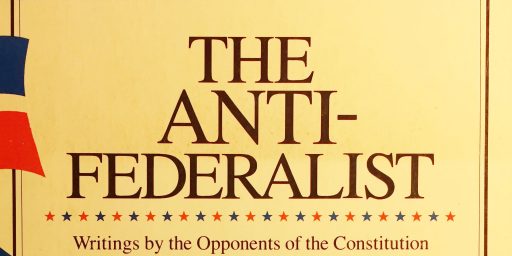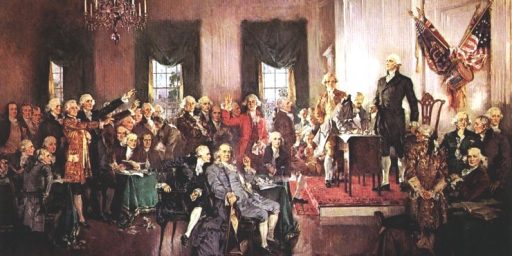On the Role of States in our Constitutional Order
Sorting out, to some degree, the role of the states in our constitutional order.
 If one were to assert that in the constitutional order of the United States that we have a system of co-equal states that retain their basic sovereignty and that have the power to nullify the actions of the central government, one would be correct. Well, one would be correct if one got in a time machine and flitted back to, say, 1785.
If one were to assert that in the constitutional order of the United States that we have a system of co-equal states that retain their basic sovereignty and that have the power to nullify the actions of the central government, one would be correct. Well, one would be correct if one got in a time machine and flitted back to, say, 1785.
At that point in our constitutional history we were governed by a document called the Articles of Confederation. Under that document each states had co-equal representation in the Congress (1 vote each, but with states sending 2-7 delegates to the body). There was no court system and effectively no executive branch. That constitution governed (I use the term loosely) the United States from 1777-1789.
It must be emphasized that the Articles of Confederation were an utter failure from a governance point of view. And so yes, the purpose of the new constitution was to create a strong central government and to subordinate the states to that central government. Put another way: to pretend like the Founders wanted a system of states able to nullify federal laws is to ignore the point that they themselves purposefully and consciously did away with such a system. Indeed, the very act that confers upon them titles like The Framers and The Founding Fathers was the act that subordinated the states to central authority. To say that, by the way, is not to endorse a particular set of policy outcomes. Nonetheless, the ultimate source of power in the US after 1789 was the central government and its constitution. This is not a disputable fact.
Now, yes, I understand that the US Constitution of 1789 creates a federal system that divides policy authority between the states and the central government.
However, I would note the following rather important points:
1. The exact nature of that division of authority has been contested, and has evolved over time. One may not like this, but it is a fact.
2. Much of that evolution has been linked to the Commerce Clause in Article I, Section 8. Again, one may or may not like the way that that evolution has played out, but to pretend like it was illegitimate and might be reversed at any moment is a wholly different proposition (even if one wishes to debate the former point, the latter point is tilting at windmills).
3. Much of the policy (as well as the above-noted evolution of the central government-state relationship) that causes the most conflict in contemporary politics are as much (if not more) about the fact that we live in a post-Industrial Revolution world than it does about whether or not Senators are appointed or elected or whether somehow states are inadequately powerful relative to the central government.
One of the things that I find interesting about a lot of people who claim a deep fealty to the US Constitution and the Founding Fathers is that they often argue as if the US Constitution should function more like the Articles of Confederation (certainly the Repeal Amendment proposal is more like the Articles than the Constitution). Further, arguments made about federal power sound a whole lot more like the Anti-Federalists than they do notions and theories put forth in the Federalist Papers.
None of this is to say that one cannot debate, for example, whether the individual mandate under the recent health care reform is constitutional or not or whether or not unfunded mandates are a problem. The point is that a lot of conversation about the role of the states in the existing constitutional order fundamentally misinterprets what the purpose of the constitution itself.
I suppose it is also worth noting that we fought a bloody war over the question of nullification and nullification lost.
A parting point (or reiteration, as it is linked to #3 above): much of our contemporary policy debate is actually far more about what we, generically, expect from government in the current era as opposed to what was the case in the late 18th Century. Even the most libertarian-minded amongst us relies far more on government than did anyone in 1790.






“I suppose it is also worth noting that we fought a bloody war over the question of nullification and nullification lost.”
It’s also worth noting that particular war was fought 150 years ago and concerned issues of much greater importance than “You can’t make me buy health insurance.”
It is also worth noting that some people are still “fighting” that war.
Now wait a minute, just the other day you argued that succession wasn’t over states’ right but over slavery. You seem to be using whichever aspect of the real cause you want for whatever helps your immediate argument. While slavery was the issue that provoked the succession, the war was fought to stop the successions. Until the 13th amendment, slavery was legal (federally) and practiced in the union states and areas under union control (recaptured areas covered by the Emancipation Proclamation excepted).
In any case, succession was essentially mooted by the income tax amendment which made us a nation of whores paid to submit by our own purloined moneys. Unfortunately, having enjoyed the power of the purse, they can’t stop even after surpassing the current tribute but rather offer markers ensuring our children and grand children will have to be turn out onto the streets to pay for our habit.
No one is suggesting we fight a war over nullification today. Instead some are proposing a constitutional amendment that is perfectly proper, legal, and peaceful.
Things have changed over the years and over the years amendments were made to the Constitution yet for some reason the proposed changes brought up today are maligned in the context of the Articles of Confederation. Sure the Articles didn’t work then but what’s to say moving slightly back in that direction wouldn’t work now? That’s what needs to be discussed, what will work now to adjust the balance power away from a central government that has indebted us and shows no sign of correcting itself.
We do rely on government much more than early citizens but should we have a government that injects itself into our daily lives to the extent it currently does? That debate is just starting.
There’s really not a whole lot that I disagree with in here. Except perhaps this:
Again, one may or may not like the way that that evolution has played out, but to pretend like it was illegitimate and might be reversed at any moment is a wholly different proposition (even if one wishes to debate the former point, the latter point is tilting at windmills).
The problem is that attempts to “reverse” this are themselves treated as illegitimate. As you point out, the relationships between the states and the federal government is an ongoing conversation. Nowhere is it written that movement should occur in a single direction. Or that movement, once taken, cannot be backtracked or a balance redefined. A desire for the states to have a larger role in this conversation is not a desire for the Articles of Confederation. No one is talking about doing away with the Presidency or the House of Representatives. The goals here are really quite modest (so modest as to be ineffective), in the greater scheme of things.
And yet it is, according to Doug, “destroying the constitution.” I agree with you that repealing the 17th amendment is not likely to change much since Republican vs Democratic politics always trumps the state-vs-national relationship. You seem to agree with James and me that the Repeal Amendment is likely to be ineffectual, but you’re responding as though this is the product of people that want a return to the AoC.
At the end of the day, though, it’s an ongoing debate. But it’s a debate with two sides. Not a debate where one side can declare the debate settled when one side seeks movement but declare movement in the other way as natural evolution.
@JKB: I do not see a contradiction in anything I have said. The root cause of the Civil War was slavery. And yet there is little doubt that nullifcation was rendered moot (not that it ever had legs to begin with) with the conclusion of the CW
@Steve: yes, as I noted in that thread, the Repeal Amendment could theoretically be ratified via a proper constitutional process. Of course, its passage would utterly rearrangement some pretty fundamental constitutional functions.
I would note that the part that Doug really thought would destroy the constitution was a constitutional convention, which Cantor seemingly endorsed.
@Trumwill:
Yes, one can legitimately want the current interpretation of the commerce clause to be reversed. Fair enough. I would argue, however, that ship has sailed (hence the titling at windmills ref).
Steven, oops, I quoted the wrong portion. I meant to quote Item #1. There may be room to try to prevent the Commerce Clause from doing more “damage” than it already has, but for the most part you’re going to have to look elsewhere to try to push back the push towards consolidation.
@Trumwill:
Gotcha. Certainly it is wholly legitimate to contest any new attempt to further expand the application of the commerce clause. My point is simply that we are not every going to go back to the 19th Century interpretation of the clause.
“…a central government that has indebted us and shows no sign of correcting itself.”
It is ridiculous to speak of a central government that has indebted us. We live in a democracy. WE have indebted ourselves. The government per se has no power to spend money other than what it receives authorization to do by the elected representatives of we the people.
I always find it amazing the way so much of the modern right seems never to have assimilated the fact that we won the American revolution – our central government is not some monarchy across the ocean – it is run by us, through our representatives.
I think this is an essential point and part of my overall point.
There is little doubt that there are imperfect mechanisms of translating popular interests into policy and there are further no doubts that government, in general (like all human endeavors) is imperfect.
Once again we see some people acting as if the federal government is some alien power from a distant galaxy made up of space creatures imposing their evil on all of us…psst, here’s a clue, these folks are elected by we, the people…so if you are so upset with what they are doing, check out a mirror, or take it up with your fellow citizens, but, to echo Tano, don’t act as if some despot is imposing his will on you…
“And yet there is little doubt that nullifcation was rendered moot (not that it ever had legs to begin with) with the conclusion of the CW”
Which way do you think slavery and nullification would have gone if America had avoided the Civil War?
@JKB
“Now wait a minute, just the other day you argued that succession wasn’t over states’ right but over slavery. You seem to be using whichever aspect of the real cause you want for whatever helps your immediate argument.”
Don’t be a dope. The “state’s right” argument was used to justify the state’s right, or the right of the state’s citizens, to engage in slavery.
@Plunk
“Things have changed over the years and over the years amendments were made to the Constitution yet for some reason the proposed changes brought up today are maligned in the context of the Articles of Confederation.”
Don’t conflate two different things: The perfectly appropriate method of amending the constitution that is being advocated and the substance of the amendment being proposed. The legitimacy of the first does not confer soundness on the second — a, at base, silly amendment that would do exactly zip to address the issues exercising those who’re pushing it.
Professor Taylor:
This is a good post .
Kudos to Joyner for having you on board.
My point is simply that we are not every going to go back to the 19th Century interpretation of the clause.
True, but not every attempt made should be seen as an insistence that we do just that. Or that we go back to the Articles of Confederation. There is the potential for smaller victories that would be seen as victories in their own right.
As an example, the Montana gun lawsuit. It’s unlikely to succeed and even if it does succeed it will probably have limited implications beyond guns (someone tries to do the same with pot and the courts can simply say “That’s different. Pot is not mentioned in the Constitution.”), but it would still be a victory for increase power at the state level all the same.
Likewise, the Repeal Act wouldn’t even come close to tipping the balance back to the 19th Century relationship between the states and national government. But for some who want the balance of power shifted in that direction, it could be a victory all the same. I doubt it for reasons I have already explained, but I could be wrong.
The article takes the side of the ‘criminal enterprise’ that the US Gov’t has evolved into. Similar to those who are ‘hell bent’ on suppressing all Wikileaks data. Most of these are friends, relatives, or perhaps, guilty themselves, of illegal activity being exposed….thus the ‘hurried attempsts’ to get it suppressed as quickly as possible.
The war referred to above, as all wars, was over money, power and land with its resources!!! Any other causes (such as slavery) are really nothing more than secondary issues ‘blown out of proportion’ to hide the 3 main causes as stated here!
• The Civil War was not one – a civil war is one where 2 sides are fighting for control of the same gov’t. The Confederacy had states that had left the United States. It had it’s own president, money, and constitution written out. The Confederate States was invaded by the USA for the same reasons all wars are started…..in a nutshell…. for money, land and power!
• This war was not over slavery but was caused by the tyrannical US gov’t imposing outrageous taxes upon the southern states and giving most of it to the rich industrialists of the northern states. The Morrill tarriff ( a 27% tax) was the last straw which drove the states to secceed from the US. The US gov’t invaded the Confederate States after realizing the substantial losses in income, land mass (as well as southern ports) not to mention saving face!!!
• This is the same US gov’t that exists today doing to all 50 states what it did to the southern states prior to them saying “ENOUGH IS ENOUGH”!!!! Over half of the 50 now have seccession groups working towards their states leaving this corrupt criminal enterprise (ie The United States of America)
Should neither ‘government reconstruction’ or ‘seccession’ not work in the near future, the chances are very good that The United States will see its ‘downfall’ in similar fashion as the downfall of “Rome’ , or worse…….the nukes may fly, and this country, as high and mighty as it thinks it is, shall be no exception to such a scenario!